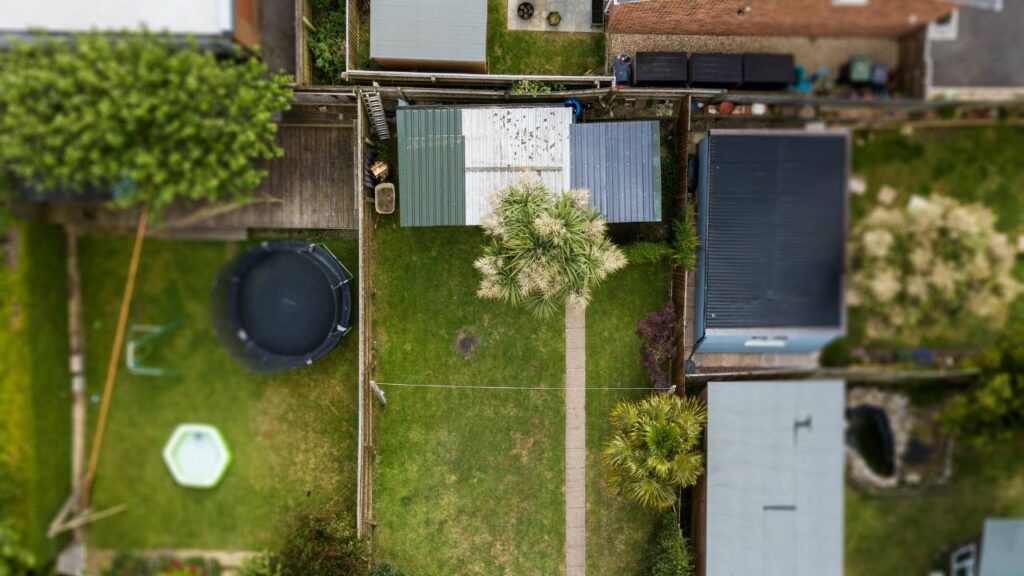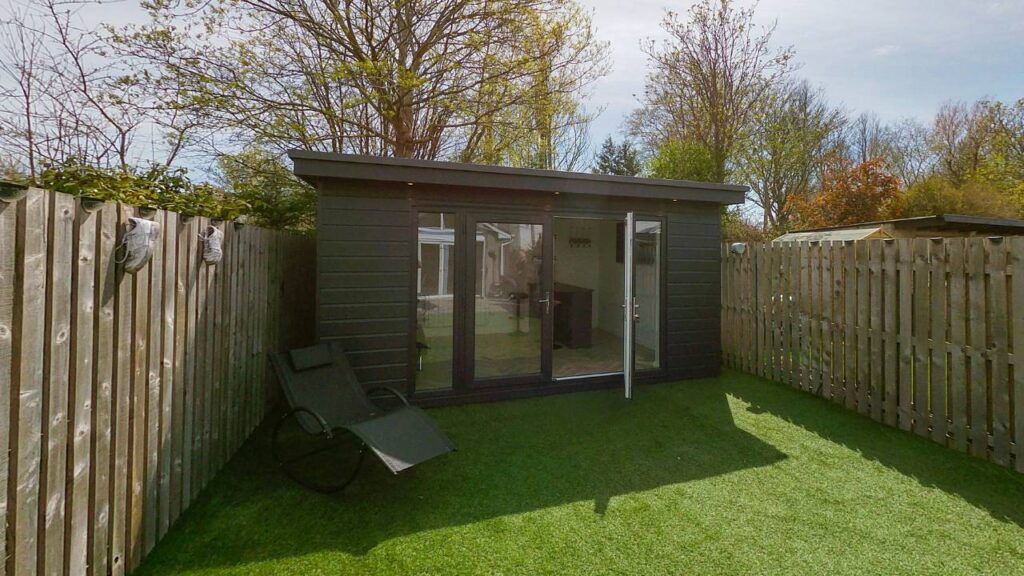A garden room might be just what you need to create the perfect home office. A garden room offers a secluded and relaxing space that enhances productivity, away from the distractions of the main house. It’s a way to balance work and nature, bringing more tranquillity into your daily routine.
Imagine stepping into your garden room each morning, surrounded by greenery and natural light. This serene environment can boost your focus and creativity, making your workday more enjoyable. Plus, a garden room can increase the value of your property while providing a versatile space.
Beyond work, your garden room can serve multiple purposes. It can be a hobby space, a quiet retreat, or even a guest room when needed. Adding this versatile space to your home combines practicality and pleasure, offering countless benefits.
Why Choose a Garden Room as Your Home Office
Choosing a garden room for your home office brings unique benefits, promoting work-life balance, productivity, and even increasing property value. Here’s why this option is worth considering.
Benefits of a Garden Office
A garden office provides a dedicated workspace separate from your main living area. This physical separation can improve focus and minimise distractions. You enjoy a peaceful, nature-filled environment that can boost creativity and reduce stress.
The ability to customise your garden room means you can design a space that caters to your specific work needs, improving comfort and efficiency. Garden rooms are also energy-efficient and sustainable, often requiring less heating and cooling compared to traditional indoor spaces.
Work-Life Balance and Productivity
Working from home can blur the lines between personal and professional life. A garden office helps maintain this distinction, allowing you to thrive while working from home. The commute is as simple as stepping outside, saving time and reducing stress.
Being closer to nature enhances mental well-being, which can translate to higher productivity. This dedicated space can also instil a sense of routine and discipline, critical for effectively managing work-from-home arrangements.
Increasing Property Value
Investing in a garden room can be a smart financial decision. It potentially increases your property’s worth by adding functional space that future buyers will likely find appealing. A well-designed garden office can set your property apart in the market.
Additionally, it’s a flexible space that can serve various purposes. Whether it remains a home office or transforms into a guest room, studio, or gym, this versatile addition enriches your home’s utility and value.
Understanding Garden Rooms

Garden rooms have become popular as versatile spaces that blend creativity with functionality. They offer flexibility, serving as offices, studios, or relaxation areas, and can be tailored to individual needs.
The Concept of Garden Rooms
Garden rooms are standalone structures, typically built from wood, glass, and other natural materials. These rooms are separate from the main house, providing a private retreat within the garden. They maximise your home’s outdoor space while adding value to your property.
They can be customised to fit various needs, from office spaces to tranquil yoga studios. The emphasis is on creating a comfortable, aesthetically pleasing environment that integrates seamlessly with the garden. With proper insulation and heating, garden rooms can be used year-round, making them a practical addition to any home.
Electric and plumbing services can be installed to increase functionality. Whether you need a quiet place to work or an area for hobbies, garden rooms offer endless possibilities for enhancing your home’s utility.
Different Types of Garden Rooms
Different types of garden rooms cater to various needs and preferences. Garden offices are a popular choice, providing a dedicated workspace away from household distractions. These usually include essential amenities like power outlets, internet connectivity, and ergonomic furniture.
Studio garden rooms are another type, ideal for artists, writers, or crafters needing a dedicated space to focus on their work. These rooms often feature large windows to let in natural light, creating an inspiring atmosphere.
Wellness rooms cater to those looking for a personal space to exercise, meditate, or practise yoga. Designed for comfort and relaxation, these rooms often include features like underfloor heating and soundproofing.
Regardless of the type, garden rooms offer a unique way to extend your living space creatively and functionally.
Planning Your Garden Room
Creating the perfect garden room requires thoughtful planning. Key aspects include assessing your individual needs, choosing a design that fits your style, and ensuring you comply with all necessary regulations.
Assessing Your Needs
Before you start any construction, identify why you need a garden room. Consider whether it’s for an office, a gym, a studio, or a relaxation space. This will help you determine the room’s size, layout, and essential features.
Think about the utilities you’ll need. Electricity, heating, and internet connectivity are crucial for a functional workspace. Assess any special requirements, like soundproofing for a studio or extra ventilation for a gym. Clarifying your needs early will guide your design choices and ensure the space is fit for purpose.
Design and Style Considerations
Design and style are essential when planning your garden room. Review different architectural styles to find one that complements your home’s exterior. Contemporary designs are often favoured for their clean lines and functionality.
Consider your garden’s available space and natural light. Shomera Ireland offers a range of styles that could inspire your choices. Think about materials, colours, and finishes that not only look good but are durable and low-maintenance. Remember to integrate storage solutions to keep your office area tidy and productive.
Permissions and Regulations
Ensuring you comply with local building regulations is crucial. Check if you need planning permission or if your project falls under permitted development rights. It’s essential to understand these aspects to avoid any legal issues.
Consult your local council for specific rules. Legal search services can provide detailed information on any restrictions or guidelines you must follow. Also, consider any covenants or restrictions associated with your property. Staying informed will help you navigate the legal landscape and complete your garden room project smoothly.
Setting Up Your Garden Office
Creating a garden office can be a great way to combine the peace of nature with a productive workspace. Consider carefully the location, insulation, lighting, and ergonomic furniture to make your garden office both comfortable and efficient.
Choosing the Right Location
Selecting an appropriate location for your garden office is crucial. You should aim for a spot that receives ample natural light and has a pleasant view. Avoid placing your office too close to noisy areas like busy roads or playgrounds. It’s important to ensure that your chosen spot has access to power and internet connections to keep your office functional.
An ideal location might be at the edge of your garden, with a view of greenery to provide a soothing backdrop. Consider the impact of weather and seasons. Choose a spot that stays dry and is not prone to flooding or excessive wind. This will help in maintaining a consistent working environment throughout the year.
The Importance of Insulation and Lighting
Insulation plays a vital role in making your garden office usable throughout the year. Proper insulation helps in maintaining a comfortable temperature, reducing the reliance on heaters or air conditioners. You can use materials like foam boards or reflective insulation to achieve this. Double-glazed windows also contribute to better insulation and soundproofing.
Lighting is another key aspect. Ensure that your garden office has enough natural light during the day. Position your desk near a window to take advantage of daylight. For evenings or cloudy days, install quality artificial lighting. LED lights are energy-efficient and provide a good quality of light that can reduce eye strain.
Ergonomics and Furniture Selection
Ergonomics is essential for a healthy and productive workspace. Invest in an ergonomic chair and desk to support good posture. Your chair should offer adjustable height and lumbar support. The desk should be large enough to accommodate your work materials and allow for proper arm positioning.
Choose furniture that fits well in your space without making it feel cramped. Consider adding shelves or storage units for organisation. A comfortable, well-designed workspace can significantly impact your productivity and well-being. Opt for a clean, clutter-free setup to create a more inviting atmosphere.
Enhancing the Ambience

Creating the perfect garden room involves more than just functionality. Cultivating an inviting atmosphere that harmonises nature with décor can transform your workspace into a productivity haven.
Integrating Nature with Decor
Biophilic design principles play a key role in bridging your garden room with the natural environment. Introduce live plants such as ferns, succulents, or even small indoor trees to enrich the space with lush greenery.
Consider an earthy colour palette with greens and browns to mimic natural elements and create a calming effect. Natural light is essential; maximise it by using sheer curtains or placing your desk near a window. Choose furniture made from wood or other natural materials to reinforce a connection with the outdoors.
Adding elements like bamboo blinds, stone sculptures, or water features can further enhance the organic feel. Wall art inspired by nature can also add a touch of the outdoors without taking up surface space.
Creating a Personalised Workspace
A personalised workspace reflects your unique style and enhances motivation. Start by selecting a colour scheme that resonates with you, whether it’s vibrant and energising or soft and tranquil. Your desk and chair should not only be comfortable but also align with your personal taste in décor.
Incorporate personal items such as photographs, favourite books, or artwork to give your workspace a homely feel. Invest in storage solutions that keep the area tidy while blending seamlessly with the room’s aesthetic. Think of items like decorative baskets, stylish shelving, and compact filing cabinets.
Technology can blend beautifully with nature; choose tech accessories in natural hues or wooden finishes. Personal touches combined with thoughtful organisation create a space where you can focus and feel truly at ease.
Practical Considerations
Creating an ideal garden room for your home office involves careful attention to storage, climate control, and technology needs to ensure a functional and comfortable workspace.
Storage Solutions and Organisation
Efficient storage keeps your garden room organised and clutter-free. Opt for built-in shelves and cabinets that fit seamlessly into your space. These can house your books, files, and other office essentials.
Wall-mounted organisers and pegboards are excellent for keeping your desk clear. They provide access to your accessories, making it easy to find what you need. Consider multi-functional furniture, such as desks with drawers, to add extra storage without compromising space.
Invest in stylish and practical storage bins or boxes for loose items. Labelling these helps maintain order and saves you time searching for things. Keeping your laptop and tech accessories organised will ensure a smooth workflow. Regularly decluttering maintains a productive environment.
Climate Control and Air Flow
Maintaining a comfortable temperature in your garden room is essential for productivity. Insulation is crucial to keep the space warm in winter and cool in summer. Double-glazed windows help regulate temperature and block outside noise.
A portable heater or electric radiator can be used during colder months. For summer, a fan or air conditioning unit will ensure you stay cool. Consider installing blinds or curtains to control sunlight and reduce glare on your laptop screen.
Proper ventilation prevents the room from getting stuffy. Windows that can be opened provide fresh air and help maintain a healthy environment. If you experience humidity issues, a dehumidifier can help manage moisture levels. Keeping indoor plants can also improve air quality and create a pleasant atmosphere.
Technology and Connectivity
Reliable technology and connectivity are vital for a home office. Ensure you have a stable internet connection by using a wired connection or a strong Wi-Fi signal. Consider investing in a Wi-Fi extender if your garden room is far from the main router.
Equipping your garden room with essential tech, such as a laptop, printer, and additional monitor, enhances productivity. Ensure you have sufficient power outlets and consider surge protectors to safeguard your devices.
Cable management solutions keep wires organised and prevent tangling. A docking station can connect your laptop to multiple peripherals, simplifying your setup. Backup solutions, like external hard drives or cloud storage, protect your data. Regular maintenance of your devices ensures they stay in good working condition, supporting an efficient work environment.
Multifunctional Garden Rooms and Future-Proofing
A garden room can be much more than just an office. With thoughtful design, it can serve multiple purposes, remaining useful even as your needs change over time.
From Office to Gym: Garden Room Versatility
Imagine transitioning from typing at your desk to working out in your own private gym. Your garden room can seamlessly transform from a productive workspace to an invigorating home gym. Add some fitness equipment like dumbbells, exercise mats, and a treadmill, and you’ve created a versatile space that supports both work and wellness.
Beyond a gym, your garden room can double as a yoga studio or music room. Simply organise your space with storage solutions to easily switch between roles. Keep yoga mats, resistance bands, or musical instruments neatly stored but readily accessible. A multifunctional garden room can be a real asset to your home, providing a space for diverse activities.
Adapting and Evolving Your Space
As your requirements evolve, your garden room can adapt too. Start with a flexible layout that includes modular furniture and multipurpose storage. This means you can replace office chairs with gym equipment or musical instruments with ease.
You might decide your garden room should now serve as a home gym. Install durable flooring and add mirrors to create an inspiring workout environment. Or, maybe a relaxing retreat space for hobbies like painting or reading. Choose elements that are easy to rearrange or remove, ensuring the room can meet diverse needs over time.
Invest in energy-efficient lighting and robust insulation. This guarantees your garden room remains comfortable and usable throughout the year, regardless of its function. The key to future-proofing your garden room lies in flexibility and smart planning.
Final Touches Before Completion

As you reach the end of your garden room project, it’s crucial to focus on the final touches that will make your home office both functional and inviting. Pay special attention to the interior design and ongoing maintenance to ensure your workspace remains in top condition.
Interior Design and Finishing Touches
Investing time in interior design can transform your garden room into a productive and inspiring workspace. Start with selecting colours that promote focus and calmness—shades like soft blues, greens, or neutral tones work well.
Furnishings are key. Choose ergonomic furniture to support comfort during long work hours. Desks should be spacious enough for your equipment, while chairs must provide proper back support.
Lighting plays a vital role. Maximise natural light, but also include task lighting for darker days. Think about adding some decorations like paintings or plants to give the space life.
Consider practical finishes such as durable flooring. Laminate or vinyl are good choices due to their ease of cleaning. Adding a rug can provide both comfort and a touch of style.
Good quality fittings, such as door handles and window latches, are essential for the functionality and overall aesthetic of your office. Invest in pieces that match your design theme while ensuring they are robust enough for daily use.
Maintaining Your Garden Office
Proper maintenance ensures your garden office remains a pleasant and efficient workspace. Regular cleaning is a must to keep the area free from dust and allergens. A weekly wipe-down of surfaces and vacuuming can make a significant difference.
Pay attention to the exterior as well. An annual check-up can prevent issues like damp, rot, or pests. Treat the wooden structures with preservatives to extend their lifespan and maintain the overall look.
Keep an eye on heating and cooling systems. Ensure your HVAC units or space heaters are serviced regularly to maintain a comfortable temperature year-round.
Inspect fittings periodically to make sure they work smoothly. Fix any loose door handles, hinges, or window latches to avoid bigger issues later.
Gardens around the office also need care. Trim plants and clear pathways to keep the entrance welcoming and free from obstructions. By regularly maintaining both the interior and exterior, you ensure your garden office remains a functional and inviting space.
Conclusion
Creating a garden room for your home office can be a transformative experience.
As you incorporate natural light and greenery, you’ll find it easier to focus and stay productive.
Additionally, the separation of work and home life becomes more tangible.
Benefits of a garden room include a refreshing space, improved mental well-being, and a heightened sense of mindfulness.
Moreover, you’ll likely enjoy reduced distractions.
Take the chance to design a space that truly reflects your personality and unique needs. This can make your workdays not only more productive but more enjoyable.
In this unique workspace, creativity and tranquillity thrive, making every workday feel less stressful and more inspiring.
You’ll discover that working from a garden room isn’t just practical; it’s a delightful way to blend work and nature, offering an unparalleled experience.
